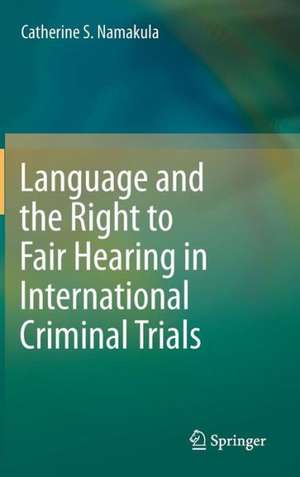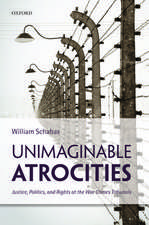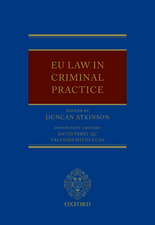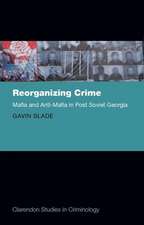Language and the Right to Fair Hearing in International Criminal Trials
Autor Catherine S. Namakulaen Limba Engleză Hardback – 21 oct 2013
Language is the core foundation for justice. It is the means through which the rights of the accused are secured and exercised. Linguistic complexities such as misunderstandings, translation errors and cultural distance among participants in international criminal trials affect courtroom communication, the presentation and the perception of the evidence, hence jeopardizing the foundations of a fair trial.
The author concludes that language fair trial rights are priority rights situated in the minimum guarantees of fair criminal trial; the obligation of the court to ensure fair trial or accord the accused person a fair hearing also includes the duty to ensure they can understand and be understood.
Preț: 640.37 lei
Preț vechi: 753.39 lei
-15% Nou
Puncte Express: 961
Preț estimativ în valută:
122.55€ • 133.07$ • 102.94£
122.55€ • 133.07$ • 102.94£
Carte tipărită la comandă
Livrare economică 22 aprilie-06 mai
Preluare comenzi: 021 569.72.76
Specificații
ISBN-13: 9783319014500
ISBN-10: 3319014501
Pagini: 168
Ilustrații: XXI, 146 p. 2 illus.
Dimensiuni: 155 x 235 x 17 mm
Greutate: 0.42 kg
Ediția:2014
Editura: Springer International Publishing
Colecția Springer
Locul publicării:Cham, Switzerland
ISBN-10: 3319014501
Pagini: 168
Ilustrații: XXI, 146 p. 2 illus.
Dimensiuni: 155 x 235 x 17 mm
Greutate: 0.42 kg
Ediția:2014
Editura: Springer International Publishing
Colecția Springer
Locul publicării:Cham, Switzerland
Public țintă
ResearchCuprins
1. Introduction.- 2. The Language Debate in International Criminal Justice.- 3. Rights or Privileges: Evaluating the Framework of Protection of Fair Trial Rights in International Criminal Law Practice.- 4. Language Rights in the Minimum Guarantees of Fair Criminal Trail.- 5. Understanding the Role of Translation in Trial Fairness.- 6. Conclusion and Recommendations.
Textul de pe ultima copertă
Language and the Right to Fair Hearing in International Criminal Trials explores the influence of the dynamic factor of language on trial fairness in international criminal proceedings. By means of empirical research and jurisprudential analysis, this book explores the implications that conducting a trial in more than one language can have for the right to fair trial. It reveals that the language debate is as old as international criminal justice, but due to misrepresentation of the status of language fair trial rights in international law, the debate has not yielded concrete reforms.
Language is the core foundation for justice. It is the means through which the rights of the accused are secured and exercised. Linguistic complexities such as misunderstandings, translation errors and cultural distance among participants in international criminal trials affect courtroom communication, the presentation and the perception of the evidence, hence jeopardizing the foundations of a fair trial.
The author concludes that language fair trial rights are priority rights situated in the minimum guarantees of fair criminal trial; the obligation of the court to ensure fair trial or accord the accused person a fair hearing also includes the duty to ensure they can understand and be understood.
Language is the core foundation for justice. It is the means through which the rights of the accused are secured and exercised. Linguistic complexities such as misunderstandings, translation errors and cultural distance among participants in international criminal trials affect courtroom communication, the presentation and the perception of the evidence, hence jeopardizing the foundations of a fair trial.
The author concludes that language fair trial rights are priority rights situated in the minimum guarantees of fair criminal trial; the obligation of the court to ensure fair trial or accord the accused person a fair hearing also includes the duty to ensure they can understand and be understood.
Caracteristici
Pioneering work establishing language fair trial rights in international law Explores a longstanding but untreated subject that forms the core foundation for justice Illuminates, for the first time, the complexities of translation in a multilingual trial process Includes supplementary material: sn.pub/extras









